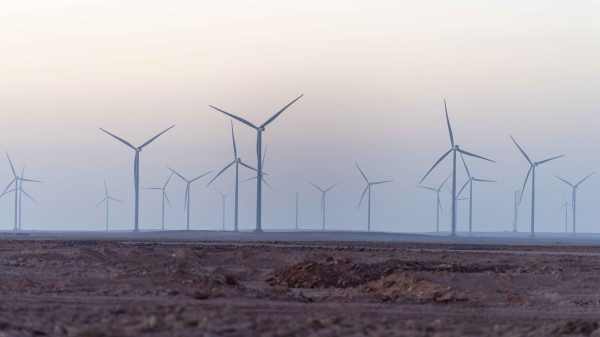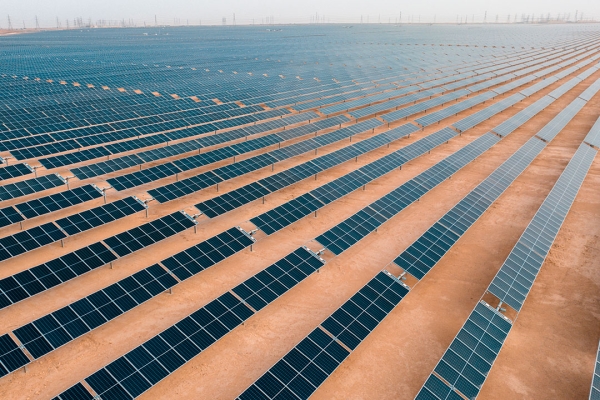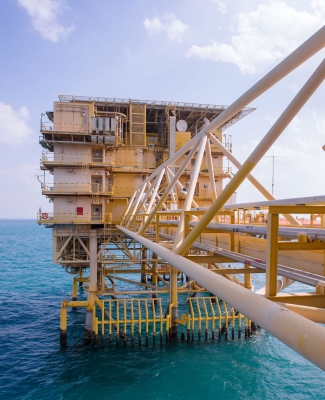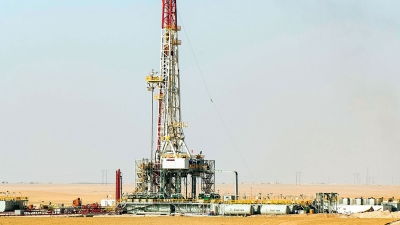


The Green Economy in the Kingdom of Saudi Arabia is one of the rapidly growing economic development models in the Kingdom. It aims to ensure sustainable economic growth, and prevent environmental pollution, global warming, resource depletion, and environmental degradation. The Kingdom has made efforts under Saudi Vision 2030 to transition to a green economy, including renewable energy projects, environmental protection, and energy efficiency projects.
The concept of the green economy gained importance due to its ability to address several global challenges, such as climate change and ensuring security in the food, energy, and water sectors. Global interest in the green economy dates back to 2008 when the United Nations launched the Green Economy Initiative to encourage policymakers to support environmental investments within the context of sustainable development.
Saudi Arabia's efforts to transition to a green economy
As part of Saudi Vision 2030, the Kingdom aims to diversify its economy and energy mix to reduce reliance on oil and enhance the social and economic well-being of its citizens. This includes implementing energy price reforms and establishing efficiency standards to contribute to reducing CO2 emissions and striving for a significant shift toward a green economy. It also announced at the Saudi Green Initiative (SGI) Forum a package of approximately sixty initiatives and projects, with investments totaling SAR700 billion, aimed at contributing to the development of the green economy.
During its G20 presidency in 2020, the Kingdom strengthened its leadership role on international shared issues and its contribution to protecting the planet. This resulted in the issuance of a special environmental declaration to ensure a sustainable future that limits environmental degradation, contributes to preserving biodiversity and the sustainable use and restoration of natural resources, protecting oceans, encouraging the availability of clean air and water, dealing with natural disasters and extreme climate phenomena, and addressing climate change.
Renewable energy projects in Saudi Arabia
On April 7, 2010, King Abdullah City for Atomic and Renewable Energy was established with the goal of building a sustainable future for the Kingdom by integrating nuclear and renewable energy sources into the local energy system. Renewable energy sources include solar power, wind energy, energy converted from waste, and geothermal energy.
The King Salman Energy Park 'SPARK' project was launched in 2018 with the aim of diversifying income sources in the Kingdom and promoting the use of clean energy technologies. The Kingdom also introduced a comprehensive national development strategy to support energy diversification, aiming to achieve 3.45 GW of renewable energy by 2020, 9.5 GW by 2030, and fifty-four GW by 2040. The Kingdom is also working on reviewing the legal and regulatory framework for private sector investment in renewable energy sources, localizing the industry by encouraging public-private partnerships. It aims to ensure the competitiveness of renewable energy by gradually deregulating the fuel market.
The Kingdom has joined the International Solar Alliance and signed an agreement with 'SoftBank' for a two hundred GW project valued at USD200 billion. Additionally, the Kingdom has launched the Solar Energy Plan 2030 to build a sustainable solar energy sector, established the Renewable Energy Project Development Office under the Ministry of Energy, and aimed to attract foreign capital to contribute to building this sector.
The Kingdom has also worked on connecting medium and small solar energy projects to the Saudi electricity grid, establishing training institutes to qualify Saudi youth, creating job opportunities for citizens in the renewable energy sector, developing a local renewable energy industry, and supporting local renewable energy research centers.
Environmental protection projects in Saudi Arabia
The Kingdom has adopted the Circular Carbon Economy (CCE) initiative and highlighted it at various global forums, including the G20 Summit 2020 held in the Capital, Riyadh. This underscores the Kingdom’s active role in emission management and the transition to clean energy. The CCE initiative aims to convert carbon emissions into raw or recycled materials by creating an independent, self-sustaining economic system based on the four pillars of the CCE concept: Reduce, Reuse, Recycle, and Remove. In this context, the Kingdom launched the National Circular Carbon Economy Program in 2021, focusing on three strategic objectives: climate protection, socio-economic impact, and achieving global leadership.
The Kingdom has called on countries around the world to cooperate in adopting the CCE to achieve carbon neutrality goals aligned with the Paris Climate Agreement, while respecting each country’s developmental aspirations and goals. Additionally, a Royal Reserves Council has been established, encompassing eight sites across the Kingdom, with the aim of preserving and enhancing vegetation cover.
On March 27, 2021, Crown Prince and Prime Minister, His Royal Highness Prince Mohammed Bin Salman Bin Abdulaziz Al Saud, announced two initiatives: "Saudi Green" and "Middle East Green". The first initiative aims to expand the Kingdom's vegetation cover, reduce carbon emissions, combat pollution and land degradation, and preserve marine life. It also seeks to reduce carbon emissions by more than 4 percent of global contributions through renewable energy projects that will provide about 50 percent of the Kingdom’s electricity by 2030. Additionally, clean hydrocarbon technologies will eliminate more than 130 million t of carbon emissions, and the initiative targets raising the waste diversion rate from landfills to 94 percent.
The Kingdom has developed a national environmental strategy that includes sixty-four initiatives to restructure the environmental sector to align with the Kingdom’s expansion and diverse environments. This strategy also addresses the significant growth in sectors impacting the environment by establishing five specialized and enabling environmental centers: the National Center for Environmental Compliance, the National Center for Vegetation Cover Development and Combating Desertification, the National Center for Waste Management, the National Center for Wildlife Development, and the National Center for Meteorology.
A team from King Fahd University of Petroleum and Minerals successfully designed and manufactured the first Arab solar car (Wahaj) registered with the American SAE system. The car's first version successfully participated in the 2011 Solar Challenge in Australia.
A campaign for sustainable environmental living was launched in Jeddah City, translating the National Environmental and Sustainable Development Plan initiative, "My Environment, Green Flag, and Green Nation." This initiative, launched by the Saudi Environmental Society and Unilever Group with the participation of Jeddah Municipality, seeks to foster cooperation in environmental matters, adopt solutions for pollution caused by industrial materials, promote the recycling of waste and residues, and work on developing green energy technologies and integrating them into the green economy.
Energy efficiency in Saudi Arabia
The Saudi Energy Efficiency Center (SEEC) was established by a decision from the Council of Ministers on November 1, 2010. This decision converted the (temporary) National Energy Management and Conservation Program at King Abdulaziz City for Science and Technology into a permanent national center within the city's administrative framework, known as the Saudi Energy Efficiency Center.
It aims to rationalize and enhance energy consumption efficiency, unify efforts between governmental and non-governmental entities, and contribute to preserving and supporting national energy resources. This will help boost national development and the economy, and achieve the lowest possible levels of consumption relative to the overall national output and population.
The Kingdom has begun operating solar-powered desalination plants in al-Khafji and Yanbu. The Saudi Water Authority is also planning to establish additional plants in Haql, Duba, and Farasan Islands, aiming to support existing fuel-based plants and to serve as long-term alternatives. Additionally, the Kingdom hosted the fifth Global Conference "Urban Environment 2015: From Waste to Energy," held during the period May 5-7, 2015, at Taibah University in al-Madinah al-Munawwarah. The conference was jointly organized by al-Madinah al-Munawwarah Municipality, King Abdullah City for Atomic and Renewable Energy, Dubai Municipality, and the Arab Cities Environment Center, with support from the Arab Towns Organization.
In early 2010, the Kingdom signed a three-phase contract to generate ten MGW of solar cells using nanotechnology to produce water at a cost of thirty-three halalas/kWh, offering a lower cost per m³. Concentrated solar cells are planned for use in the third phase.
Related quizzes

